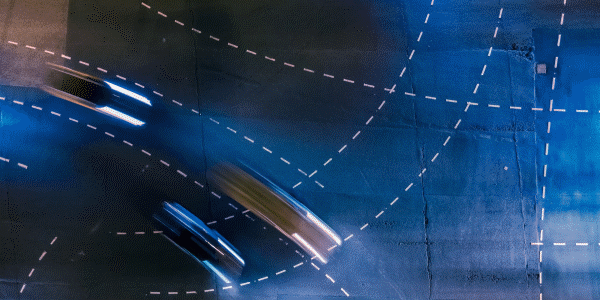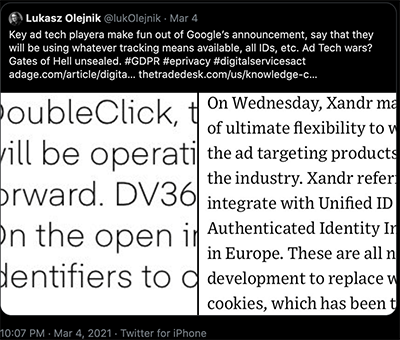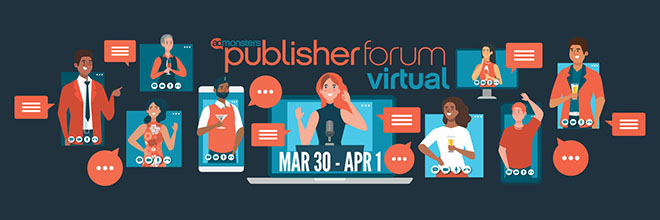 |
|||||||||||||
|
|||||||||||||
| An Ecosystem Divided |

Photo by Luca Bravo on Unsplash
|
| "Are we creating two different ecosystems?" Shenan Reed, SVP, Head of Media, L'Oréal asked Jerry Dischler, Vice President / General Manager for Ads at Google during his IAB ALM Keynote this week. It's the resounding question echoing throughout the advertising ecosystem, ever since Google's David Temkin, Director of Product Management, Ads Privacy and Trust, dropped a bomb about the ad tech giant's plan not to replace third-party cookies with identifiers last week on the company's ads & commerce blog. That announcement was not taken so well across the industry, particularly from ad tech vendors who have been placing major bets on IDs as the privacy-safe future for tracking and measuring advertising campaigns. But while Google doesn't plan to support ad targeting based on identifiers, it will continue to let those identifiers live in Chrome and Chromium-based browsers. "Publishers will continue to have control over buyers and vendors they work with. Ad Manager will not stop this," said Dischler. "We're already in a fragmented state. There's no magic bullet to create a single view of the user across browsers and devices." |
| Although Google's plans have been met with enormous amounts of skepticism and criticism, Google maintains that this strategy is in the best interest of users and building a more privacy-safe future for the open web. "We know a lot of you in ad tech are still not buying it," Dischler said. But for buyers, Google is developing metrics on view throughs, full attribution, incrementality, and the like—without cookies—and they feel strong about their solutions based on FLoC, which is their cookie replacement for putting people into groups based on interests. For pubs, Google's idea is that those armed with a robust first-party data strategy will be able to use AI and Machine Learning to close the gaps. Dischler's keynote hasn't reassured nary a member of #adtech Twitter, much less those tweeting on the #IABALM thread, that Google's replacement for 3P cookies will be just as effective. Yet, not everyone in the advertising ecosystem is convinced that Google's news is all bad. Tom Kershaw, CTO, Magnite and chairman of Prebid.org thinks the industry is blowing the Google announcement way out of proportion. “It does not mean that they’re banning them or going to war with them or in any way restricting them. It was simply a statement of Google’s intent to support Privacy Sandbox,” he told Beet.TV. In essence, IDs are not dead, it just means the industry needs a more comprehensive solution that mixes together a little bit of everything into what Loatame calls a portfolio strategy. Google is consulting with PRAM, a conglomerate consisting of the 4A’s, ANA, IAB, as well as W3C to better define the future of advertising. In that vein, the IAB Tech Lab just unveiled several technical specifications and best practices—for re-architecting digital media for addressability with accountability and privacy—that are now open to the industry for comment. In the end, it's gonna take the whole industry to determine the future of advertising, no single man (or entity) should have that on lock. |
 |
| Brands Are Hungry For New Digital Ad Options—Can Publishers Serve Them Up? | ||
| Despite the breadth of real estate in the digital world, three companies—Google, Facebook, and Amazon— eat up 85% of digital advertising budgets in the United States. But, that could soon be changing. During the pandemic, people turned to digital channels for watchable content, like streaming video, or to do new things, like online grocery shopping. Consumers explored new websites and subscribed to timely services. And, brands are paying attention— they are moving money away from traditional platforms and channels into digital media. |
||
| While the remaining 15% of advertising dollars left up for grabs is likely to grow, it remains up to publishers to innovate and expand their digital presence, building their audiences and enticing advertisers to spend with them. To effectively compete for ad budgets, publishers need to:
More to come in the next installment of The Wrapper. |
||
|
||
| Around the Water Cooler |
Here's what else we're reading this week...
|
| @{optoutfooterhtml}@ |










